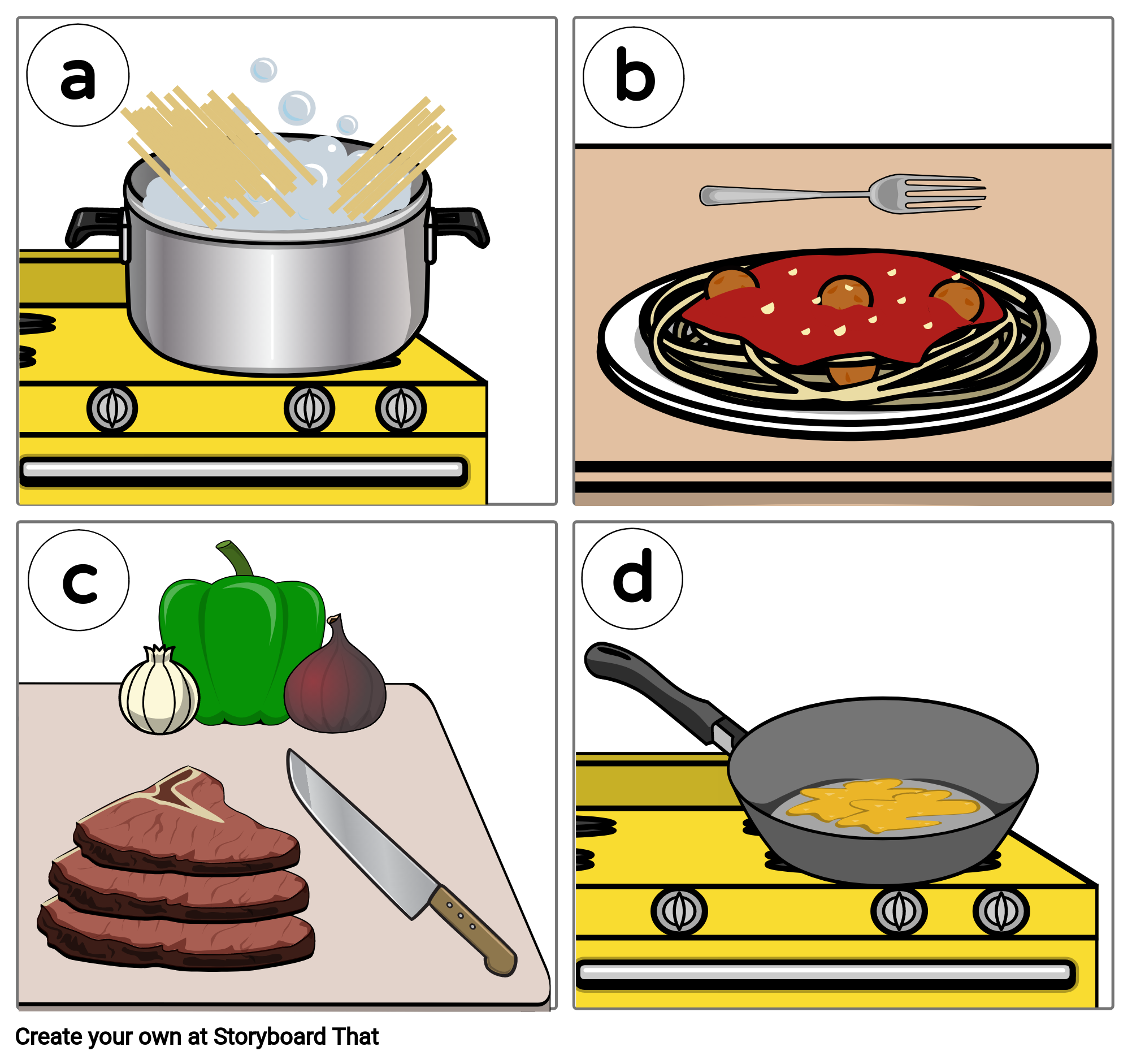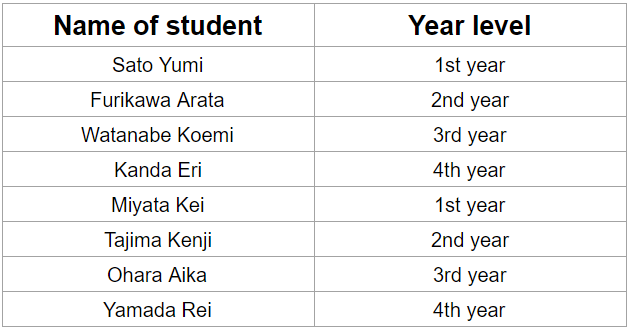PART A_1
In this lesson, we have two parts, listening and reading.
We will start with the listening part. Then, we are going to move on to the reading part.
Let’s start our lesson!
We will start with the listening part. Then, we are going to move on to the reading part.
Let’s start our lesson!
このレッスンではリスニングとリーディングの2つのパートがあります。
まずはリスニングパートから始めます。その後、リーディングパートに移ります。さあ、始めましょう!
まずはリスニングパートから始めます。その後、リーディングパートに移ります。さあ、始めましょう!
PART A_2
Please listen carefully and take notes while I read the passage. Then, look at the picture and tell me the correct order of the story.
講師が読み上げる文章をよく聞いて、メモしましょう。そして、聞いた話に沿って絵を並び替えてください。
PART A_3

| 1. | . | |
| 2. | . | |
| 3. | . | |
| 4. | . |
PART A_4
Now, let’s review your answer.
答え合わせをしましょう。
PART A_5
PART B_1
Please listen carefully and take notes while I read the passage. Then, please look at the table and answer the questions below.
講師が読み上げる文章をよく聞きましょう。そして表と質問について回答をしてください。
PART B_2

| Question: | Tell me which students are in each year and what the schedule of their online class is. | |
| 1. | First year | |
| Answer: | . | |
| 2. | Second year | |
| Answer: | . | |
| 3. | Third year | |
| Answer: | . | |
| 4. | Fourth year | |
| Answer: | . |
PART B_3
Now, let’s review your answer.
答え合わせをしましょう。
PART B_4
PART C_1
We are done with the listening part. So, let’s move on to the reading part.
リスニングパートは終わりです。リーディングパートを始めましょう。
PART C_2
We will read aloud the words below. Please repeat after me. I will check your pronunciation.
単語を音読します。講師に続いて読みましょう。講師は発音を確認します。
(Please send the mispronounced words and phrases to your student.)
PART C_3
| 1. | forbid |
|
禁じる
|
|
| 2. | embed |
|
組み込む
|
|
| 3. | solace |
|
安堵
|
|
| 4. | punishment |
|
罰
|
|
| 5. | distressing |
|
苦痛な
|
PART C_4
Now, let’s review some words from part C_3.
ではいくつかの単語を復習してみましょう。
(Please review the mispronounced words and expressions from part C_3.)
PART C_5
PART D_1
Now, you will make sentences by using the words you learned.
習った単語を使って文章を作りましょう。
(Please send the sentences that need grammar corrections to your student.)
PART D_2
forbid
embed
solace
punishment
distressing
| 1. | He has found _____ in his friends. |
| 2. | My parents _____ me to go out every night. |
| 3. | Being hospitable is _____ in our culture. |
| 4. | His life when he was young was very _____. |
| 5. | A long time ago, _____ were cruel and unusual. |
PART D_3
Now, let’s review your answers.
では、あなたの答えを復習してみましょう。その後、修正したあなたの答えを読んでみましょう。
(Please review your student’s answers by sending the correct answers in complete sentences. After that, ask your student to read aloud his or her corrected answers.)
PART D_4
PART E_1
We will read aloud the passage below. Please repeat after me. I will check your pronunciation.
文章を音読します。講師に続いて読みましょう。講師は発音を確認します。
(Please send the mispronounced words and expressions to your student.)
PART E_2
In Japan, if you do something wrong, your parents lock you out of the house. You might have the experience of being told, “Get out of the house!” In the States, however, you are forbidden to leave the house. We call this ” being grounded.” This cultural difference suggests a deeply embedded concept of what a “house” represents. Locking children out suggests that home is a place where they want to be, a place of safety and solace. The outside world is a dangerous place where children must face their punishment for breaking the rules. By contrast, forbidding a child to go outside suggests that being confined to the house is distressing. A difference in culture is a difference in perspective.
PART E_3
Now, let’s review some words and phrases from part E_2.
ではいくつかの単語や表現を復習してみましょう。
(Please review the mispronounced words and expressions.)
PART E_4
PART E_5
I will ask the following questions. Please answer based on the passage. I will check if your sentences are complete and if the grammar is correct.
講師が質問するので音読した文章の内容に沿って答えましょう。講師は文法と完全な文章であるかを確認します。
(Please send the sentences that need grammar corrections to your student.)
PART E_6
| 1. | What do Japanese parents do when their kids do something wrong? |
| Answer: | |
| 2. | What do American parents do when their kids do something wrong? |
| Answer: | |
| 3. | In Japan, what kind of place is “the outside world” for a child? |
| Answer: | |
| 4. | What does forbidding a child to go outside suggest? |
| Answer: |
PART E_7
Now, let’s review your answers.
では、あなたの答えを復習してみましょう。
(Please review your student’s answers by sending the correct answers in complete sentences. After that, ask your student to read aloud his or her corrected answers.)
PART E_8
PART F_1
We will read aloud the words below. Please repeat after me. I will check your pronunciation.
単語を音読します。講師に続いて読みましょう。講師は発音を確認します。
(Please send the mispronounced words and phrases to your student.)
PART F_2
| 1. | assign |
|
割り当てる
|
|
| 2. | overtime |
|
残業
|
|
| 3. | look forward to |
|
~楽しみにする
|
|
| 4. | hopefully |
|
うまくいけば
|
|
| 5. | available |
|
あいている
|
PART F_3
Now, let’s review some words and phrases from part F_2.
ではいくつかの単語を復習してみましょう。
(Please review the mispronounced words and expressions from part F_2.)
PART F_4
PART G_1
Now, you will make sentences by using the words you learned.
習った単語を使って文章を作りましょう。
(Please send the sentences that need grammar corrections to your student.)
PART G_2
assign
overtime
look forward to
Hopefully
available
| 1. | Cancel the meeting, she is not _____ today. |
| 2. | We _____ him arriving next week. |
| 3. | I usually go _____ these days so I’m exhausted. |
| 4. | My boss _____ a new task to me. |
| 5. | _____ they would come to visit sometime. |
PART G_3
Now, let’s review your answers.
では、あなたの答えを復習してみましょう。その後、修正したあなたの答えを読んでみましょう。
(Please review your student’s answers by sending the correct answers in complete sentences. After that, ask your student to read aloud his or her corrected answers.)
PART G_4
PART H_1
We will read aloud the passage below. Please repeat after me. I will check your pronunciation.
文章を音読します。講師に続いて読みましょう。講師は発音を確認します。
(Please send the mispronounced words and expressions to your student.)
PART H_2
Hi Eric,
Sorry that I haven’t replied to you sooner. I just got assigned to a big project this week. I worked three hours of overtime yesterday and still had to get up at six this morning. You’d think that after ten years of working in Tokyo, I’d be used to this lifestyle, right? But guess what, I’m not! But I have something to look forward to now. There’s this cute girl who just started working with us, but I’ll tell you more about her some other time. Anyway, enough about me.
How are you doing? You know, I think I’ll have a little more time next week. So hopefully I’ll be able to meet you for a coffee or something. When will you be available next week? Please let me know.
Cheers,
Tom
PART H_3
Now, let’s review some words and phrases from part H_2.
ではいくつかの単語や表現を復習してみましょう。
(Please review the mispronounced words and expressions.)
PART H_4
PART H_5
I will ask the following questions. Please answer based on the passage. I will check if your sentences are complete and if the grammar is correct.
講師が質問するので音読した文章の内容に沿って答えましょう。講師は文法と完全な文章であるかを確認します。
(Please send the sentences that need grammar corrections to your student.)
PART H_6
| 1. | What is Tom sorry about? |
| Answer: | |
| 2. | What time did Tom get up this morning? |
| Answer: | |
| 3. | How many hours of overtime did Tom work yesterday? |
| Answer: | |
| 4. | What does Tom say about after having worked in Tokyo for 10 years? |
| Answer: |
PART H_7
Now, let’s review your answers.
では、あなたの答えを復習してみましょう。
(Please review your student’s answers by sending the correct answers in complete sentences. After that, ask your student to read aloud his or her corrected answers.)
PART H_8